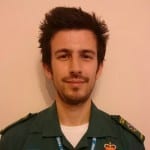 Three members of the CaHRU team, Professor Niro Siriwardena, Dr Stephanie Armstrong and Greg Whitley (paramedic and doctoral student) led an interactive exploration of the latest research and innovation in ambulance care in a session entitled ‘Innovations in ambulance service care: ‘bangs, brains and hearts’ as part of the Lincoln Get Hold of Technology and Science (LiGHTS) Expo on 29 September 2017.
Three members of the CaHRU team, Professor Niro Siriwardena, Dr Stephanie Armstrong and Greg Whitley (paramedic and doctoral student) led an interactive exploration of the latest research and innovation in ambulance care in a session entitled ‘Innovations in ambulance service care: ‘bangs, brains and hearts’ as part of the Lincoln Get Hold of Technology and Science (LiGHTS) Expo on 29 September 2017.
 The seminar was presented twice to around 40 members of the public in all aged 7 to 60+ years. It explored the kind of care we can expect currently from ambulance services. The team explained how today’s ambulance service is about far more than transporting people to hospital. Prof Siriwardena discussed how ambulance services should be measured using an animation from the Prehospital Outcomes for Evidence Based Evaluation (PhOEBE) programme. Steph Armstrong discussed ‘Why do ambulance research and how difficult is it?’ exploring the difficulties of randomising patients and gaining consent in this setting. Prof Siriwardena then spoke about the use of GTN (also known as nitroglycerine, a component of
The seminar was presented twice to around 40 members of the public in all aged 7 to 60+ years. It explored the kind of care we can expect currently from ambulance services. The team explained how today’s ambulance service is about far more than transporting people to hospital. Prof Siriwardena discussed how ambulance services should be measured using an animation from the Prehospital Outcomes for Evidence Based Evaluation (PhOEBE) programme. Steph Armstrong discussed ‘Why do ambulance research and how difficult is it?’ exploring the difficulties of randomising patients and gaining consent in this setting. Prof Siriwardena then spoke about the use of GTN (also known as nitroglycerine, a component of  dynamite) for stroke in the RIGHT2 trial and Greg Whitley, paramedic on the AIRWAYS2 trial explained the different airways device being tested in the study.
dynamite) for stroke in the RIGHT2 trial and Greg Whitley, paramedic on the AIRWAYS2 trial explained the different airways device being tested in the study.
The seminar continued with a hands-on exercise involving cardio-pulmonary resuscitation, looking at airway devices and listening to heart sounds with a stethoscope. There was also plenty of audience participation with questions, answers and prizes! Prof Siriwardena and Dr Stephanie Armstrong gave an interview to Melvyn Prior at BBC Radio Lincolnshire as part of the event.
